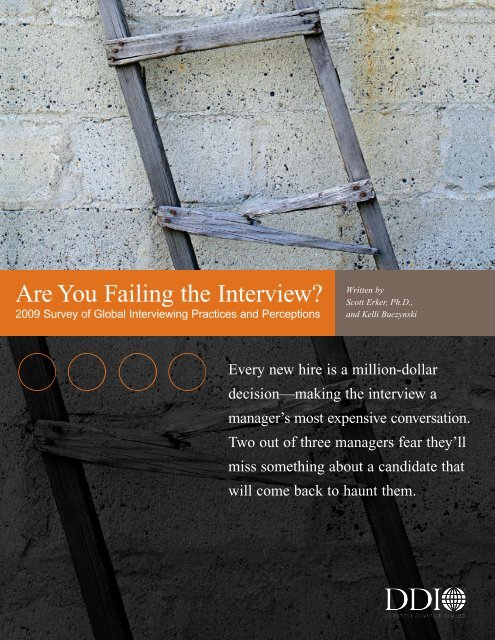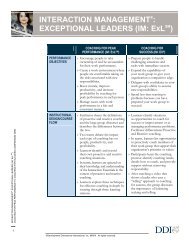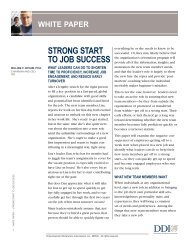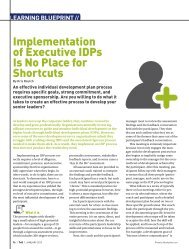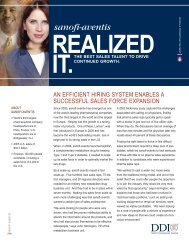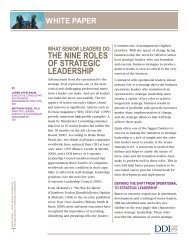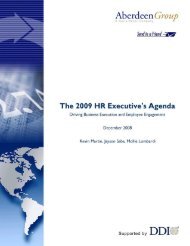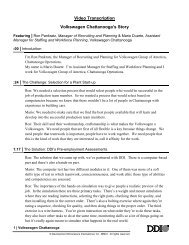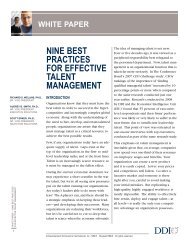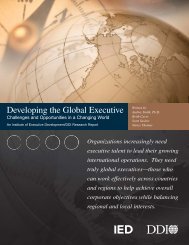Are You Failing the Interview? - Development Dimensions ...
Are You Failing the Interview? - Development Dimensions ...
Are You Failing the Interview? - Development Dimensions ...
You also want an ePaper? Increase the reach of your titles
YUMPU automatically turns print PDFs into web optimized ePapers that Google loves.
<strong>Are</strong> <strong>You</strong> <strong>Failing</strong> <strong>the</strong> <strong>Interview</strong>?<br />
2009 Survey of Global <strong>Interview</strong>ing Practices and Perceptions<br />
Written by<br />
Scott Erker, Ph.D.,<br />
and Kelli Buczynski<br />
Every new hire is a million-dollar<br />
decision—making <strong>the</strong> interview a<br />
manager’s most expensive conversation.<br />
Two out of three managers fear <strong>the</strong>y’ll<br />
miss something about a candidate that<br />
will come back to haunt <strong>the</strong>m.
<strong>Are</strong> <strong>You</strong> <strong>Failing</strong> <strong>the</strong> <strong>Interview</strong>?<br />
2009 Survey of Global <strong>Interview</strong>ing Practices and Perceptions<br />
Written by<br />
Scott Erker, Ph.D.,<br />
and Kelli Buczynski<br />
Scott Erker, Ph.D., is <strong>the</strong> senior vice president of Selection Solutions<br />
for DDI. He oversees <strong>the</strong> design and implementation of comprehensive<br />
selection systems that improve <strong>the</strong> speed and quality of hiring<br />
decisions, working with a number of Fortune 500 companies, including<br />
General Motors, Microsoft, Kodak, and Coca-Cola. He has been<br />
a featured speaker at SIOP, Kennedy’s Recruiting Conference and<br />
<strong>the</strong> Global Workforce Leadership Summit and is frequently quoted in<br />
business and trade publications including The Wall Street Journal<br />
and Sales & Marketing Management.<br />
Kelli Buczynski, is a manager for DDI’s Selection Solutions. Since<br />
joining DDI in 1994, she has consulted with clients and managed<br />
learning and development projects in addition to managing <strong>the</strong> day-today<br />
implementation processes for delivery of training and certification<br />
workshops within DDI. Kelli’s current responsibilities include leading<br />
<strong>the</strong> Targeted Selection ® product line and supporting <strong>the</strong> research,<br />
development, marketing, sales, and delivery of DDI’s selection and<br />
assessment products.
4<br />
Why Making <strong>the</strong> Grade Matters<br />
<strong>Are</strong> <strong>You</strong> <strong>Failing</strong> <strong>the</strong> <strong>Interview</strong>?<br />
The interview remains <strong>the</strong> key decision-making tool<br />
for virtually every job in <strong>the</strong> world. And not only<br />
for bringing new people into <strong>the</strong> organization.<br />
Promotions, special assignments, job rotations, and<br />
succession planning also often involve interviews.<br />
The practice is so common, so expected, that many<br />
organizations and interviewers take it for granted.<br />
<strong>Interview</strong>ers consider <strong>the</strong>mselves to be good judges<br />
of character, and believe <strong>the</strong>y don’t need formal<br />
interviewing training.
As a result, <strong>the</strong> interview process is not given <strong>the</strong> attention it deserves.<br />
<strong>Interview</strong>ers come unprepared for <strong>the</strong> discussion or turn candidates off with unprofessional<br />
behavior. They make decisions based on “gut instinct” instead of relevant facts. Many ask<br />
inappropriate—even illegal—questions that can land <strong>the</strong>ir organizations in hot water.<br />
To what extent are interviewers across <strong>the</strong> world succeeding or failing in <strong>the</strong>se areas?<br />
What impact might <strong>the</strong>se errors be having on identifying and landing <strong>the</strong> top applicants?<br />
At <strong>the</strong> end of 2008, DDI surveyed 1,910 interviewers and 3,523 job seekers across <strong>the</strong><br />
world. In particular, we wanted to understand what people sitting on both sides of <strong>the</strong><br />
table—interviewers and interviewees—think is working and not working. Their responses<br />
led to some interesting findings:<br />
<strong>Interview</strong>ers often make hasty decisions.<br />
Almost half of all interviewers are not formally trained—and it makes a<br />
big difference in <strong>the</strong>ir decision-making ability.<br />
<strong>Interview</strong>ers think <strong>the</strong>y are doing a better job than <strong>the</strong>y really are.<br />
Common interviewer techniques turn candidates off.<br />
<strong>Interview</strong>ers are increasingly relying on information ga<strong>the</strong>red from<br />
social networking sites to make hiring decisions.<br />
Here’s a closer look at <strong>the</strong> survey’s findings, along with DDI’s advice on how to improve<br />
failing grades and achieve consistently better results on <strong>the</strong> most common and widespread<br />
“hiring exam” your organization gives.<br />
<strong>Are</strong> <strong>You</strong> <strong>Failing</strong> <strong>the</strong> <strong>Interview</strong>?<br />
3<br />
<strong>Are</strong> <strong>You</strong> <strong>Failing</strong> <strong>the</strong> <strong>Interview</strong>?
4<br />
<strong>Are</strong> <strong>You</strong> <strong>Failing</strong> <strong>the</strong> <strong>Interview</strong>?<br />
KEY FINDINGS<br />
A Decision in Under 30 Minutes<br />
Businesses tend to be careful decision makers when large sums of money are at<br />
stake. Major business decisions—such as whe<strong>the</strong>r to purchase that new accounting<br />
system, where to situate that new facility, or which advertising agency to choose—<br />
require extensive deliberation that can last months.<br />
Like <strong>the</strong>se business decisions, hiring decisions can be worth millions to an organization.<br />
DDI’s research shows that top employees are two to three times more productive<br />
than average performers: Bank tellers generate higher customer satisfaction ratings;<br />
line workers produce more with fewer defects; star sales reps close more contracts<br />
at higher margins. 1 Over time, this performance gap quickly adds up to millions lost<br />
in unrealized revenue and increased costs.<br />
But how intently are interviewers considering this potentially high-stakes decision?<br />
FIGURE 1: AVERAGE TIME SPENT MAKING A CANDIDATE DECISION<br />
Figure 1 shows that 47 percent of interviewers spend less than 30 minutes reviewing<br />
a candidate’s interview results with o<strong>the</strong>rs before making a decision. Just think, in<br />
<strong>the</strong> time it takes you to watch your favorite TV show or have an extra-cheese-andpepperoni<br />
pizza delivered to your home, employers are making million-dollar hiring<br />
decisions.
We would expect <strong>the</strong> time spent deliberating over a prospective employee to vary<br />
depending on <strong>the</strong> level of <strong>the</strong> job; however, less than 30 minutes is woefully<br />
inadequate for all but <strong>the</strong> most junior roles within an organization.<br />
Not surprisingly, younger interviewers spend less time deliberating than older<br />
interviewers: 70 percent of interviewers under 25 spend less than 30 minutes,<br />
compared to just 36 percent of those over age 50. <strong>You</strong>nger people just entering<br />
<strong>the</strong> workforce are likely at lower levels within <strong>the</strong>ir organization, and <strong>the</strong>refore<br />
interviewing people for lower-level jobs. On <strong>the</strong> flip side, older workers have<br />
probably learned from experience that not being thorough in discussing candidates<br />
can lead to bad hiring decisions.<br />
FIGURE 2: PERCENT OF INTERVIEWERS THAT SPEND 30 MINUTES OR LESS<br />
Percent of<br />
<strong>Interview</strong>ers<br />
France U.K. Canada U.S. Australia Germany<br />
70% 51% 50% 42% 41% 34%<br />
Figure 2 looks at decision-making speed by country, showing <strong>the</strong> percentage of<br />
interviewers who spend less than 30 minutes reviewing candidates with o<strong>the</strong>r<br />
interviewers before making a hiring decision. French interviewers are <strong>the</strong> fastest<br />
decision makers: 70 percent spend less than 30 minutes. Even more astonishing<br />
is that 30 percent spend less than 10 minutes! German interviewers are much more<br />
deliberate, with 66 percent spending more than 30 minutes and 25 percent devoting<br />
at least an hour.<br />
Anyone who has interviewed an obviously unqualified candidate would tell you that<br />
<strong>the</strong> decision not to offer a job can be quick and painless. But quick decisions to hire<br />
someone should make any HR professional or business executive uncomfortable—<br />
mistakes can be costly. <strong>You</strong> must be confident your hiring managers are making<br />
highly considered, sound decisions.<br />
So do you know what kind of deliberations your hiring managers are having<br />
in this short amount of time?<br />
<strong>Are</strong> <strong>the</strong>y having “thumbs-up, thumbs-down” hallway chats with <strong>the</strong> o<strong>the</strong>r interviewers?<br />
Or are <strong>the</strong>y actually evaluating candidates against each criteria for success on<br />
<strong>the</strong> job and having meaningful, detailed discussions before making a decision?<br />
“I have good people<br />
sense—all I need is<br />
10 minutes and I know.”<br />
– Canadian interviewer<br />
<strong>Are</strong> <strong>You</strong> <strong>Failing</strong> <strong>the</strong> <strong>Interview</strong>?<br />
5<br />
<strong>Are</strong> <strong>You</strong> <strong>Failing</strong> <strong>the</strong> <strong>Interview</strong>?
“Hiring is a strategic action<br />
for an organization. Any<br />
mistake has a real impact<br />
on <strong>the</strong> company running<br />
smoothly.”<br />
– French interviewer<br />
6<br />
<strong>Are</strong> <strong>You</strong> <strong>Failing</strong> <strong>the</strong> <strong>Interview</strong>?<br />
We asked interviewers to describe <strong>the</strong>ir decision-making process. Most interviewers<br />
told us <strong>the</strong>y ultimately make independent hiring decisions, even if <strong>the</strong>y briefly consult<br />
with o<strong>the</strong>r interviewers. Only 46 percent of interviewers hold formal, in-depth discussions<br />
with all interviewers to reach a consensus about a candidate.<br />
FIGURE 3: PERCENT OF INTERVIEWERS CONDUCTING IN-DEPTH DISCUSSIONS WITH OTHER INTERVIEWERS<br />
Percent of<br />
<strong>Interview</strong>ers<br />
France U.K. Australia Germany Canada U.S.<br />
56% 54% 47% 44% 43% 40%<br />
Figure 3 shows considerable global differences in <strong>the</strong> use of formal decision-making<br />
discussions. A majority of interviewers in France and <strong>the</strong> U.K. hold formal discussions<br />
with o<strong>the</strong>r interviewers before a decision is made, while those in <strong>the</strong> United States<br />
are far more independent.<br />
It’s not surprising that service (33 percent) and retail (30 percent) organizations<br />
make quick, independent decisions. Jobs in <strong>the</strong>se industries tend to be entry level<br />
and prone to turnover. Job seekers in <strong>the</strong>se areas also tend to have more choices,<br />
so an abbreviated interview process and on-<strong>the</strong>-spot hiring decisions are often<br />
critical to landing <strong>the</strong> candidate. If <strong>the</strong> process is too complicated or takes too long,<br />
candidates can just walk down to <strong>the</strong> next store in <strong>the</strong> shopping mall and apply <strong>the</strong>re.<br />
For o<strong>the</strong>r positions and o<strong>the</strong>r industries, <strong>the</strong> power of a good decision-making<br />
process comes from interviewers sharing <strong>the</strong> information <strong>the</strong>y’ve collected, <strong>the</strong>n<br />
evaluating based on all <strong>the</strong> available data, not just <strong>the</strong>ir own information. This<br />
process of sharing and combining data is called data integration. Data integration<br />
creates synergy among interviewers: The combined data becomes more than <strong>the</strong><br />
sum of its parts, enabling interviewers to identify trends and patterns <strong>the</strong>y might<br />
o<strong>the</strong>rwise miss. The result is an overall view of <strong>the</strong> candidate that you can use to<br />
accurately and fairly predict performance in <strong>the</strong> target job. The sharing process<br />
doesn’t have to be lengthy. A good discussion can be completed in less than<br />
30 minutes if interviewers come prepared.
HOW TO CONDUCT A<br />
SUCCESSFUL CANDIDATE<br />
EVALUATION DISCUSSION<br />
Data integration is a powerful quality control process designed to control biases<br />
and stereotypes, maintain hiring standards, and ensure fair and accurate selection.<br />
The power of <strong>the</strong> process comes from interviewers sharing <strong>the</strong> information <strong>the</strong>y’ve<br />
collected and <strong>the</strong>n evaluating <strong>the</strong> interviewing competencies or targets (skills,<br />
experiences, etc.) based on all of <strong>the</strong> available data, not just <strong>the</strong>ir own data.<br />
The result is a profile of each candidate’s strengths and weaknesses that can be<br />
used to accurately and fairly predict performance in <strong>the</strong> job.<br />
The data integration process looks like this:<br />
1. All of <strong>the</strong> interviewers who ga<strong>the</strong>red behavioral information about <strong>the</strong> candidates<br />
meet to discuss each candidate.<br />
2. Focusing on one candidate at a time, each interviewer shares <strong>the</strong> behavioral<br />
evidence collected and organized for each competency or target.<br />
3. Covering one competency, <strong>the</strong> group discusses <strong>the</strong> behaviors collected for a<br />
given competency and develops a consensus rating for a candidate in that target<br />
(typically a 5-point rating scale where a 5 means exceptional performance,<br />
3 means successful performance, and 1 means inadequate performance).<br />
4. After this process is completed for every target, <strong>the</strong> group analyzes <strong>the</strong><br />
candidate’s overall profile and decides whe<strong>the</strong>r to retain or reject <strong>the</strong> person.<br />
It is unlikely that each interviewer will give <strong>the</strong> same rating for each candidate.<br />
The process of sharing behavioral data, discussing <strong>the</strong> rationale for each rating, and<br />
reaching a consensus rating is one of <strong>the</strong> most interesting and revealing parts of<br />
data integration. The advantage of this approach is that interviewers get a chance to<br />
review <strong>the</strong>ir data and are held accountable for collecting behavioral data and justifying<br />
<strong>the</strong>ir opinion to <strong>the</strong> group. Over time <strong>the</strong>y become calibrated about what good<br />
and poor performance “looks like.” Ultimately, <strong>the</strong>y make more effective decisions.<br />
<strong>Are</strong> <strong>You</strong> <strong>Failing</strong> <strong>the</strong> <strong>Interview</strong>?<br />
7
“I’m great at reading<br />
poker faces.”<br />
– U.S. interviewer<br />
8<br />
<strong>Are</strong> <strong>You</strong> <strong>Failing</strong> <strong>the</strong> <strong>Interview</strong>?<br />
<strong>Interview</strong>ers <strong>Are</strong>n’t as Good as They Think<br />
The interviewers overwhelmingly thought that <strong>the</strong>y had excellent interviewing skills<br />
and make high-quality hiring decisions.<br />
Why are <strong>the</strong>y so confident? They feel that <strong>the</strong>y have impeccable instinct. A Canadian<br />
interviewer told us “I have good people sense—all I need is 10 minutes and I know.”<br />
A U.S. interviewer remarked “I’m great at reading poker faces.” Ano<strong>the</strong>r said “I’m<br />
good at pursuing questions on <strong>the</strong> fly.”<br />
O<strong>the</strong>r interviewers cited <strong>the</strong>ir experience. A U.K. interviewer said “I’ve always made<br />
<strong>the</strong> right decision on candidates.” A German interviewer told us “I’ve employed<br />
people for 20 years.”<br />
But is all of this confidence really warranted?<br />
FIGURE 4: TOP INTERVIEWER WORRIES
We asked interviewers to identify <strong>the</strong>ir top three worries associated with <strong>the</strong> interviewing<br />
process. Despite interviewers’ high opinion of <strong>the</strong>mselves, two-thirds worry<br />
<strong>the</strong>y’ll miss important information about a candidate’s weaknesses that will show<br />
up later on <strong>the</strong> job, and half aren’t sure <strong>the</strong>y have enough information to make a<br />
sound decision.<br />
At <strong>the</strong> very bottom of <strong>the</strong> worries were knowing which questions to ask and asking<br />
illegal or inappropriate questions. This is interesting, because asking <strong>the</strong> right<br />
behavioral questions tied to what’s needed for success on <strong>the</strong> job is how to ensure<br />
you don’t miss important information. As for asking illegal or inappropriate questions,<br />
<strong>the</strong> next section shows where that risky practice can lead.<br />
So what kind of training justifies this high confidence level?<br />
FIGURE 5: TRAINING METHODS USED TO PREPARE FOR CONDUCTING INTERVIEWS<br />
48%<br />
Informal<br />
on-<strong>the</strong>-job<br />
training<br />
44%<br />
I rely on<br />
instinct<br />
27%<br />
Attended a<br />
class with skill<br />
practice<br />
27%<br />
Attended<br />
a class<br />
18%<br />
Read a book<br />
16%<br />
None<br />
7%<br />
Online course<br />
We asked interviewers to describe how <strong>the</strong>y were trained to conduct interviews.<br />
Figure 5 shows that one of <strong>the</strong> biggest issues at play is <strong>the</strong> lack of training and <strong>the</strong><br />
heavy reliance on “gut instinct.” Although “informal on-<strong>the</strong>-job training” (48 percent) is<br />
<strong>the</strong> most common way interviewers have been prepared to conduct interviews, “I use<br />
my instinct” (44 percent) is not far behind. In <strong>the</strong> U.S., “instinct” jumps to 56 percent,<br />
compared to much lower rates in <strong>the</strong> U.K. (32 percent) and France (26 percent).<br />
All told, 58 percent of interviewers report having ei<strong>the</strong>r no interviewer skills training or<br />
relying on <strong>the</strong>ir instincts.<br />
“My informal<br />
interview style<br />
makes interviewees<br />
more honest.”<br />
– Sou<strong>the</strong>ast Asian<br />
interviewer<br />
<strong>Are</strong> <strong>You</strong> <strong>Failing</strong> <strong>the</strong> <strong>Interview</strong>?<br />
9<br />
<strong>Are</strong> <strong>You</strong> <strong>Failing</strong> <strong>the</strong> <strong>Interview</strong>?
“I feel competent but<br />
not perfect.”<br />
– U.K. interviewer<br />
10<br />
<strong>Are</strong> <strong>You</strong> <strong>Failing</strong> <strong>the</strong> <strong>Interview</strong>?<br />
So what impact does this lack of training have on interviewer skill,<br />
confidence, and decision making?<br />
FIGURE 6: INTERVIEWER SATISFACTION<br />
The quality of my hiring<br />
decisions is an A or B<br />
90%<br />
81%<br />
Skills Training<br />
My interview skills<br />
are an A or B<br />
83%<br />
52%<br />
I am confident I am<br />
making <strong>the</strong> right decisions<br />
No Skills Training<br />
80%<br />
65%<br />
Figure 6 shows that on several key measures, interviewers with interviewer skills<br />
training are more satisfied than those with no training.<br />
The people with no training have a different set of worries as well. They are less<br />
worried about candidates accepting <strong>the</strong>ir job offers (16 percent versus 26 percent).<br />
They are significantly more worried about <strong>the</strong> impression <strong>the</strong>y’re making with<br />
candidates (24 percent versus 15 percent). More importantly, <strong>the</strong>y are more than<br />
twice as worried about what questions to ask (19 percent versus 6 percent).<br />
The confidence level of those interviewers who ei<strong>the</strong>r rely on instinct or have had<br />
informal on-<strong>the</strong>-job training is <strong>the</strong> same as those who have received formal training.<br />
But <strong>the</strong>se two groups are slightly more concerned about missing important information<br />
about candidates’ weaknesses during <strong>the</strong> interview than <strong>the</strong>ir formally trained<br />
counterparts (71 percent versus 62 percent).<br />
We all recognize <strong>the</strong> problems with no training or relying on gut instinct. But what’s<br />
wrong with informal training?<br />
The problem with informal training is just that—it’s informal. It can easily be inconsistent,<br />
and result in inconsistent interviews, even among candidates for <strong>the</strong> same job.<br />
It may focus interviewers on hiring someone to fill an immediate need, when it might<br />
be more beneficial to consider <strong>the</strong> organization’s long-term needs. Sure that candidate<br />
can do <strong>the</strong> job today, but what about his potential for promotion, or her potential<br />
to perform in today’s world of job rotations and global business?<br />
Despite <strong>the</strong>se questions, interviewer confidence isn’t surprising to us—or to HR<br />
professionals struggling to justify to <strong>the</strong>ir overworked managers why interviewer<br />
training is worth <strong>the</strong>ir time. In DDI’s experience, we find that interviewers often<br />
come to training believing <strong>the</strong>y are already proficient. But when newly trained<br />
interviewers are asked to rate where <strong>the</strong>y were before training and where <strong>the</strong>y<br />
are after, <strong>the</strong>ir answers reveal <strong>the</strong> truth: They didn’t know what <strong>the</strong>y didn’t know.
What <strong>Interview</strong>ers Don’t Know is Putting <strong>You</strong> at Risk<br />
Ranking lowest among interviewers’ top-rated concerns was <strong>the</strong> worry <strong>the</strong>y were asking<br />
illegal or inappropriate questions. Only 5 percent of interviewers ranked it among<br />
<strong>the</strong>ir top three concerns. Yet, when asked to identify whe<strong>the</strong>r certain questions were<br />
illegal or inappropriate, many of <strong>the</strong>se same interviewers chose <strong>the</strong> wrong answers.<br />
In each country in <strong>the</strong> study, questions about marital status, plans to have children,<br />
religious persuasion, age, ethnicity, and sexual orientation are illegal. Figure 7<br />
shows that a significant number of interviewers in each country are not aware <strong>the</strong>se<br />
questions are illegal to ask in <strong>the</strong>ir country. <strong>Interview</strong>ers in Australia, France, and<br />
Germany appear to be <strong>the</strong> least aware of <strong>the</strong> legality of <strong>the</strong>se questions: On average<br />
60 percent of interviewers in <strong>the</strong>se countries thought <strong>the</strong>se questions were legal.<br />
FIGURE 7: DO PEOPLE KNOW WHAT IS LEGAL? PERCENT OF INTERVIEWERS WHO THOUGHT<br />
THESE ILLEGAL QUESTIONS WERE LEGAL<br />
AUSTRALIA CANADA FRANCE GERMANY U.K. U.S.<br />
<strong>Are</strong> you married? 68% 41% 88% 96% 69% 40%<br />
Do you plan to have children? 62% 49% 67% 68% 47% 42%<br />
Do you belong to a religious organization? 52% 30% 36% 53% 49% 31%<br />
How old are you? 67% 39% 96% 96% 51% 30%<br />
How would you describe your ethnicity? 47% 30% 26% 53% 52% 24%<br />
What is your sexual orientation? 27% 16% 21% 21% 26% 17%<br />
How did you hurt your leg? 93% 85% 90% 86% 94% 79%<br />
In <strong>the</strong> U.S. and Canada, high-profile lawsuits have raised <strong>the</strong> stakes. Still 20 to 40<br />
percent of interviewers in <strong>the</strong>se countries missed <strong>the</strong> mark on identifying <strong>the</strong> illegal<br />
questions. For example, a significant percentage of U.S. interviewers did not recognize<br />
that many personal questions are illegal to ask: someone’s marital status (40 percent<br />
didn’t know); whe<strong>the</strong>r <strong>the</strong>y were planning to have children (42 percent); <strong>the</strong>ir religious<br />
affiliation (31 percent); <strong>the</strong>ir age (30 percent); and ethnicity (24 percent).<br />
Eighty to ninety percent of interviewers in each country did not know “How did<br />
you hurt your leg?” is also an illegal question. In each of <strong>the</strong> countries in <strong>the</strong> study,<br />
it’s illegal to discriminate against disability. In fact, employers must adapt <strong>the</strong>ir<br />
workplace and job to meet <strong>the</strong> needs of employees with disabilities. This question<br />
is illegal because <strong>the</strong> interviewer may be perceived as trying to uncover information<br />
about a permanent or temporary disability.<br />
<strong>Are</strong> <strong>You</strong> <strong>Failing</strong> <strong>the</strong> <strong>Interview</strong>?<br />
11<br />
<strong>Are</strong> <strong>You</strong> <strong>Failing</strong> <strong>the</strong> <strong>Interview</strong>?
“I’m able to gauge a<br />
person’s sincerity.”<br />
– Australian interviewer<br />
12<br />
SURVEY DATA<br />
AT A GLANCE<br />
<strong>Are</strong> <strong>You</strong> <strong>Failing</strong> <strong>the</strong> <strong>Interview</strong>?<br />
Organizations in every country need to be concerned about <strong>the</strong>se results, not only<br />
because of <strong>the</strong> legal risk, but also because <strong>the</strong> lack of professionalism will affect<br />
your organization’s reputation and its ability to attract and land <strong>the</strong> best candidates.<br />
Hiring laws can vary widely around <strong>the</strong> world. Understanding different practices<br />
becomes especially important when interviewers from different countries are interviewing<br />
<strong>the</strong> same candidate. For example, in <strong>the</strong> U.K., it is generally considered<br />
polite to ask about a candidate’s family, even though most of <strong>the</strong>se questions are<br />
illegal. Ano<strong>the</strong>r issue in <strong>the</strong> U.K., as well as France and Germany, may simply be<br />
that <strong>the</strong> law changes frequently and interviewers outside of HR are not always<br />
aware of <strong>the</strong> latest rulings. In Australia, <strong>the</strong> diversity of cultures makes it common<br />
and comfortable for interviewers to discuss “Where are you from?” even though <strong>the</strong><br />
topic should be avoided.<br />
It is critical for organizations to conduct <strong>the</strong> appropriate research and to clearly<br />
communicate to all interviewers what is legal, what is appropriate, and what is not.<br />
Organizations should also be aware that common interview questions such as<br />
“What would you do if I gave you an elephant?” or “What kind of Disney character<br />
would you be?” are irrelevant because <strong>the</strong>y do not provide any insight into specific<br />
job-related behaviors. Organizations should instead focus <strong>the</strong>ir interviewers on<br />
behavioral questions to help <strong>the</strong>m directly assess whe<strong>the</strong>r a candidate has<br />
previously displayed <strong>the</strong> behavior necessary to succeed on <strong>the</strong> job, and if so, how well.<br />
TOP JOB SEEKER TURN-OFFS<br />
43% <strong>Interview</strong> techniques are more like interrogations.<br />
42% Taking too long to get back to me.<br />
39% Not being up-front about details like salary, hours, expectations.<br />
35% Keeping me waiting for a long period of time.<br />
30% Questions that are not relevant to <strong>the</strong> job.<br />
25% Acting like <strong>the</strong>y have no time to talk to me.<br />
22% Being unprepared for <strong>the</strong> interview.<br />
22% Asking inappropriate questions.<br />
12% Never giving me <strong>the</strong> opportunity to ask questions.<br />
12% When several interviewers ask <strong>the</strong> same questions.
“Selling <strong>You</strong>rself” Isn’t Just for Candidates<br />
As interviewers are proudly congratulating <strong>the</strong>mselves on <strong>the</strong>ir good instincts and<br />
interviewing skills, those seated on <strong>the</strong> o<strong>the</strong>r side of <strong>the</strong> table are not as complimentary.<br />
Figure 8 shows how job seekers graded <strong>the</strong>ir recent interviewing experiences.<br />
The vast majority of job seekers (75 percent) rated <strong>the</strong>ir experience a B or C.<br />
An additional 8 percent rated <strong>the</strong>ir experiences even lower.<br />
FIGURE 8: HOW JOB SEEKERS GRADE THEIR INTERVIEW EXPERIENCE<br />
<strong>You</strong> might be thinking <strong>the</strong>re’s nothing wrong with more than half of job seekers<br />
rating <strong>the</strong>ir experience average (C) or above average (B). But this means a large<br />
group of candidates is less than impressed with <strong>the</strong>ir interview experiences.<br />
Have you ever left a job interview never having connected with <strong>the</strong> interviewer?<br />
How does that compare to leaving <strong>the</strong> interview and jumping up and down with<br />
excitement when you are alone in <strong>the</strong> elevator? The fact is, lukewarm experiences<br />
are not likely to land passive job seekers or truly elite candidates who have o<strong>the</strong>r<br />
employment options.<br />
FIGURE 9: GRADING THE INTERVIEWERS<br />
Interpersonal<br />
<strong>Are</strong>as 75% 72% 68%<br />
Process<br />
<strong>Interview</strong>er<br />
Courteousness<br />
Openness to<br />
answering<br />
my questions<br />
<strong>Interview</strong>er<br />
Professionalism<br />
<strong>Are</strong>as 71% 69% 63%<br />
Questions<br />
are appropriate<br />
Questions<br />
are relevant<br />
to <strong>the</strong> job<br />
Thoroughly<br />
described<br />
<strong>the</strong> job<br />
64%<br />
Made me feel<br />
like a good<br />
candidate<br />
50%<br />
Follow-up<br />
after <strong>the</strong><br />
interview<br />
58%<br />
58%<br />
Conveyed Showed interest<br />
excitement in my needs and<br />
about <strong>the</strong> job career goals<br />
“I get bored listening<br />
to poor candidates.”<br />
– U.K. interviewer<br />
<strong>Are</strong> <strong>You</strong> <strong>Failing</strong> <strong>the</strong> <strong>Interview</strong>?<br />
13<br />
<strong>Are</strong> <strong>You</strong> <strong>Failing</strong> <strong>the</strong> <strong>Interview</strong>?
“<strong>Interview</strong>s can be<br />
too forward or like<br />
interrogations,<br />
removing some of <strong>the</strong><br />
human element.”<br />
– French job seeker<br />
14<br />
SURVEY DATA<br />
AT A GLANCE<br />
<strong>Are</strong> <strong>You</strong> <strong>Failing</strong> <strong>the</strong> <strong>Interview</strong>?<br />
We asked job seekers to rate specific elements of <strong>the</strong>ir interview experiences. Figure 9<br />
shows that job seekers think some areas are going well, while o<strong>the</strong>r areas have room<br />
for improvement. Overall, job seekers believe interviewers are doing a good job in<br />
key interpersonal areas related to <strong>the</strong> interview—courteousness, professionalism, and<br />
openness to answering <strong>the</strong>ir questions.<br />
They do expect more enthusiasm from <strong>the</strong> interviewer, both in showing excitement<br />
for <strong>the</strong> job and in being interested in <strong>the</strong>ir goals and aspirations. For candidates,<br />
an unenthusiastic and detached interviewer is a sign of what it would be like to work<br />
with this person if <strong>the</strong>y take <strong>the</strong> job.<br />
Several key interview process areas were also poorly rated. Job seekers thought<br />
interviewers could do a better job of describing <strong>the</strong> position. They were particularly<br />
dissatisfied with <strong>the</strong> promptness of follow-up after <strong>the</strong> interview: 26 percent of job<br />
seekers rated this area a D or F.<br />
Why should organizations and <strong>the</strong>ir interviewers care about job seekers’ perceptions?<br />
First, you want to ensure that candidates feel that all applicants are treated <strong>the</strong> same.<br />
If you impress candidates (meeting <strong>the</strong>ir personal needs) and have a good interview<br />
process (meeting <strong>the</strong> practical needs to get information from candidates and share<br />
information about <strong>the</strong> job/organization), “fairness” is less likely to be an issue.<br />
Second, while we may not have <strong>the</strong> war for talent as in years past, high-quality<br />
candidates may still be considering many offers. Research by DDI and Monster<br />
reveals that 91 percent of job seekers say <strong>the</strong>ir perception of <strong>the</strong> interviewer affects<br />
<strong>the</strong>ir decision to accept a job offer (34 percent say it significantly affects it). 2 In addition,<br />
negative perceptions can multiply—how many of you have come out of an unprofessional<br />
interview experience and warned your friends to stay away? Plus, you don’t<br />
know when a candidate today could turn into a customer tomorrow.<br />
HOW TO REALLY BLOW THE INTERVIEW: TOP INTERVIEWER TURN-OFFS<br />
26% The candidate hasn't taken <strong>the</strong> time to learn about <strong>the</strong> job or <strong>the</strong> organization.<br />
21% The candidate is arrogant or overly confident.<br />
15% The candidate shows up late.<br />
12% The candidate did not ask any questions about <strong>the</strong> job or what it is like to work here.<br />
6% The candidate doesn't speak professionally.<br />
6% The candidate won't fit into our culture.<br />
5% The candidate dresses inappropriately.<br />
4% The candidate talks too much.
Organizations have a golden opportunity to impress every candidate <strong>the</strong>y interview.<br />
The key is to focus on what’s important to <strong>the</strong> candidate and find a match in what<br />
<strong>the</strong> job and organization offer. Once you identify <strong>the</strong> common thread, you can weave<br />
it throughout <strong>the</strong> process with <strong>the</strong> help of interviewers and o<strong>the</strong>r points of contact.<br />
It could be something as simple as having interviewers mention <strong>the</strong>ir own professional<br />
travels to a candidate interested in travel opportunities, or touting <strong>the</strong> company’s<br />
charitable efforts to candidates interested in “giving back.”<br />
These connections are critical to selling <strong>the</strong> job and <strong>the</strong> organization—a skill as important<br />
to interviewers as knowing how to reinforce an employment brand and how to be<br />
a proactive talent scout. <strong>Interview</strong>ers who embrace this broader role go far beyond<br />
merely “filling an opening” in <strong>the</strong>ir hiring decisions. They are <strong>the</strong> ones most likely to<br />
make <strong>the</strong> grade, earning excellent ratings as interviewers and excellent results for<br />
<strong>the</strong>ir organizations.<br />
Eating while<br />
I’m being<br />
interviewed<br />
(U.S.).<br />
Making you feel you<br />
have to beg to get<br />
in (SE Asia).<br />
Treating me like a<br />
child (Australia).<br />
JOB SEEKER PET PEEVES<br />
Mocking me during<br />
<strong>the</strong> interview (U.S.).<br />
<strong>Interview</strong>ers playing<br />
amateur<br />
psychologists (U.K.).<br />
Bad mouthing<br />
employees within<br />
<strong>the</strong> organization<br />
(Canada).<br />
Just using me<br />
to fill a quota<br />
of interviews<br />
(Australia).<br />
SURVEY DATA<br />
AT A GLANCE<br />
<strong>Are</strong> <strong>You</strong> <strong>Failing</strong> <strong>the</strong> <strong>Interview</strong>?<br />
15<br />
<strong>Are</strong> <strong>You</strong> <strong>Failing</strong> <strong>the</strong> <strong>Interview</strong>?
“Act like a fool and<br />
you’ll be one.”<br />
– U.S. job seeker<br />
16<br />
<strong>Are</strong> <strong>You</strong> <strong>Failing</strong> <strong>the</strong> <strong>Interview</strong>?<br />
Big Bro<strong>the</strong>r Isn’t Watching…or is He?<br />
A wea<strong>the</strong>rman fired for a Facebook photo depicting drug use. Teenagers fired from<br />
a store in Canada for bragging about stealing on MySpace. Teachers with exotic<br />
videos on <strong>You</strong>Tube that undermine <strong>the</strong>ir credibility in <strong>the</strong> classroom.<br />
These are all stories of people who were reckless enough to post shocking or<br />
inappropriate content for all to see. Many of <strong>the</strong> job seekers in our study had little<br />
sympathy for <strong>the</strong>se tales of woe. A job seeker from <strong>the</strong> U.K. noted that “<strong>You</strong>r<br />
character becomes public knowledge.” Ano<strong>the</strong>r one from <strong>the</strong> U.S. commented<br />
“Act like a fool and you’ll be one.”<br />
If employers are firing employees based on Internet postings, it’s reasonable to<br />
expect that employers are also searching <strong>the</strong> Web for information about candidates.<br />
But is this perception accurate? How prevalent is this practice?<br />
We asked interviewers if <strong>the</strong>y check candidates’ social networking sites to find out<br />
additional information. We found that only 25 percent of interviewers check sites like<br />
Facebook and MySpace. As might be expected however, <strong>the</strong> practice becomes<br />
more prevalent <strong>the</strong> younger <strong>the</strong> interviewer: Only 19 percent of those over 50 check<br />
<strong>the</strong>se sites compared to 46 percent of those under 25.<br />
FIGURE 10: PERCENT OF INTERVIEWERS WHO SEARCH CANDIDATE NETWORKING SITES<br />
Figure 10 illustrates how widespread this practice is across <strong>the</strong> globe. German<br />
interviewers are almost twice as likely to conduct <strong>the</strong>se searches as any o<strong>the</strong>r<br />
country. On <strong>the</strong> o<strong>the</strong>r end of <strong>the</strong> spectrum, only 12 percent of interviewers from<br />
<strong>the</strong> U.K. rely on site searches.<br />
Don’t let <strong>the</strong> low prevalence of searches on Facebook and MySpace fool you.<br />
The number of companies playing Internet detective is increasing. A 2006 survey<br />
by ExecuNet found that 77 percent of executive recruiters “Google” for additional<br />
information on candidates. 3
But <strong>the</strong> million-dollar question is, how much does it impact <strong>the</strong> decision<br />
making of those who do search?<br />
The 2006 ExecuNet study found that 35 percent of recruiters who search chose<br />
not to hire applicants based on information <strong>the</strong>y uncovered, up from 26 percent in<br />
2005. We asked this same question and found that what was novel two years ago<br />
has now become <strong>the</strong> norm: 52 percent of interviewers who conduct searches use<br />
<strong>the</strong> information to make hiring decisions.<br />
A majority of interviewers in every country make decisions based on this information,<br />
except in <strong>the</strong> U.K. (33 percent). In France and <strong>the</strong> U.S., over 60 percent of interviewers<br />
who conduct <strong>the</strong>se searches have used this information to make a hiring decision.<br />
It is likely <strong>the</strong> increasing trend will continue right around <strong>the</strong> world. So are job seekers<br />
in on <strong>the</strong> secret? And how do <strong>the</strong>y feel about it?<br />
Our survey suggests that job seekers are ra<strong>the</strong>r naïve about what’s going on. Less<br />
than one-third (32%) believe that what <strong>the</strong>y put on social networking sites impacts<br />
<strong>the</strong> results of a job search. U.S. job seekers are much more aware of <strong>the</strong> practice<br />
(43 percent), while those in Australia, France, and <strong>the</strong> U.K. are less so (all less than<br />
25 percent). Seekers in <strong>the</strong> U.K. are right to not be concerned, given <strong>the</strong> low use<br />
of online information by U.K. interviewers (12 percent). But this should serve as a<br />
warning call to those in Australia and France, where over 50 percent of interviewers<br />
make a decision based on online information.<br />
We already mentioned that <strong>the</strong> common reaction from job seekers was to preach<br />
abstinence—if you don’t want potential employers to see it, don’t post it. However,<br />
a significant number of job seekers feel <strong>the</strong> practice is an invasion of privacy.<br />
A German job seeker told us “My private life should not bo<strong>the</strong>r <strong>the</strong> company.”<br />
Ano<strong>the</strong>r from <strong>the</strong> U.K. said “<strong>You</strong>r free time is not <strong>the</strong> same as your work time.”<br />
What’s <strong>the</strong> lesson? Internet use shows no signs of decreasing, so a steady increase<br />
in its use in hiring—including researching candidates—is inevitable. Job seekers<br />
should assume that current and potential employers will see what <strong>the</strong>y post online,<br />
and decide whe<strong>the</strong>r to let that impact what <strong>the</strong>y choose to post.<br />
Employers should realize that much of what’s posted on social networking sites is<br />
done in fun, and may not reflect a candidate’s on-<strong>the</strong>-job demeanor or performance.<br />
Also keep in mind that most of this information is not job-related and <strong>the</strong>refore should<br />
not be factored into <strong>the</strong> hiring decision. Finally, a well-planned, well-conducted interviewing<br />
process can go a long way toward discounting—or confirming—impressions<br />
gained from online searches.<br />
“My private life should<br />
not bo<strong>the</strong>r <strong>the</strong><br />
company.”<br />
– German job seeker<br />
<strong>Are</strong> <strong>You</strong> <strong>Failing</strong> <strong>the</strong> <strong>Interview</strong>?<br />
17<br />
<strong>Are</strong> <strong>You</strong> <strong>Failing</strong> <strong>the</strong> <strong>Interview</strong>?
20<br />
About <strong>the</strong> Participants<br />
<strong>Are</strong> <strong>You</strong> <strong>Failing</strong> <strong>the</strong> <strong>Interview</strong>?<br />
JOB SEEKERS<br />
• Employment status: 65% Full-Time; 18% Part-Time; 17% Unemployed<br />
• Tenure: 52%
Acknowledgements<br />
Project Management: Jeanine Buell, Jennifer Pesci-Kelly, Bradford Thomas<br />
Research Team: Colby Fazio, Julie Hogan, Simon Mitchell, Betsy Piasente<br />
Editorial: Christine Hollinger, Sue Wilson<br />
Graphic Design: Susan Ryan, Stacy Infantozzi<br />
Endnotes 1. Sinar, E. & Howard, A. (2008). 2008 driving business results: Delivering top talent<br />
through employment testing. Pittsburgh, PA: DDI Press. And Thomas, B. & Del Rossa, J.<br />
(2008). Swapping engines in mid-air: 2008 sales talent management benchmark study.<br />
Pittsburgh, PA: DDI Press.<br />
2. Howard, A.; Erker., S. & Bruce, N. (2008). Selection forecast 2006-2007:<br />
Slugging through <strong>the</strong> war for talent. Pittsburgh, PA: DDI Press.<br />
3. Growing Number Of Job Searches Disrupted By Digital Dirt. (2006). Norwalk, CT:<br />
ExecuNet. Retrieved February 11, 2009 from<br />
http://www.execunet.com/m_releases_content.cfm?id=3349<br />
<strong>Are</strong> <strong>You</strong> <strong>Failing</strong> <strong>the</strong> <strong>Interview</strong>?<br />
21
20<br />
<strong>Are</strong> <strong>You</strong> <strong>Failing</strong> <strong>the</strong> <strong>Interview</strong>?<br />
<strong>Are</strong> you making <strong>the</strong><br />
best hiring decisions?<br />
<strong>Are</strong> your interviewers getting <strong>the</strong> information <strong>the</strong>y need to make <strong>the</strong> best hiring<br />
decisions? With over 3 million better interviewers around <strong>the</strong> world, DDI’s<br />
Targeted Selection ® is <strong>the</strong> most accurate, proven behavioral interviewing system.<br />
Targeted Selection ® . . .<br />
• Builds interviewer skills and confidence through engaging learning design.<br />
• Provides customizable interview guides for all jobs and levels—ensuring<br />
interviews are job-critical and use legally acceptable questions.<br />
• Captures data on a candidate’s entire profile: experience, knowledge,<br />
competencies, and motivations.<br />
• Ensures that <strong>the</strong> candidates you really want say, “Yes.”<br />
• Significantly reduces risk of employment legal challenges.<br />
• Provides a consistent hiring process anywhere in <strong>the</strong> world (available in<br />
14 languages).<br />
• Offers unmatched training delivery flexibility—from <strong>the</strong> classroom to <strong>the</strong> web.<br />
• Goes beyond <strong>the</strong> hiring decision to help get new hires up to speed and<br />
contributing faster.<br />
Take <strong>You</strong>r <strong>Interview</strong>ing to <strong>the</strong> Next Level<br />
To learn more about how <strong>the</strong> new Targeted Selection ® can help you hire<br />
and promote <strong>the</strong> best talent, visit www.ddiworld.com/selection or call<br />
1-800-933-4463.
THE AMERICAS<br />
WORLD<br />
HEADQUARTERS<br />
PITTSBURGH<br />
412.257.0600<br />
MEXICO CITY<br />
52.55.1253.9000<br />
TORONTO<br />
416.644.8370<br />
O<strong>the</strong>r offices include<br />
Atlanta, Calgary,<br />
Chicago, Dallas,<br />
Detroit, Monterrey,<br />
Montreal, New York,<br />
San Francisco,<br />
Santiago, and<br />
São Paulo<br />
EUROPE/AFRICA<br />
DÜSSELDORF<br />
49.2159.91680<br />
LONDON<br />
44.1753.616000<br />
PARIS<br />
33.1.41.96.86.86<br />
O<strong>the</strong>r offices include<br />
Johannesburg,<br />
St. Petersburg,<br />
and Warsaw<br />
ASIA-PACIFIC<br />
SHANGHAI<br />
86.21.6113.2525<br />
SINGAPORE<br />
65.6226.5335<br />
SYDNEY<br />
612.9466.0300<br />
TO LEARN MORE:<br />
EMAIL: INFO@DDIWORLD.COM<br />
WWW.DDIWORLD.COM<br />
MKTSEMIS95-0309-1MA<br />
O<strong>the</strong>r offices include<br />
Auckland, Bangkok,<br />
Beijing, Brisbane,<br />
Hong Kong, Jakarta,<br />
Kuala Lumpur, Manila,<br />
Melbourne, Mumbai,<br />
Perth, Taipei, and Tokyo<br />
In today’s grow-or-die marketplace, having <strong>the</strong> right talent strategy is crucial for an<br />
organization’s success. <strong>Development</strong> <strong>Dimensions</strong> International will help you systematically<br />
and creatively close <strong>the</strong> gap between <strong>the</strong> talent you have and <strong>the</strong> talent you need to drive<br />
future business strategies.<br />
We excel in:<br />
:: Competency models that are linked directly to your business.<br />
:: Screening and assessment, enabling you to hire <strong>the</strong> right people with a full<br />
range of validated tests and assessments.<br />
:: Behavioral interviewing, helping hiring managers and recruiters make<br />
accurate hiring decisions.<br />
:: Performance management to foster individual accountability and superior<br />
execution of your strategic priorities.<br />
:: Succession management expertise and assessment systems to help you<br />
make critical placement and promotion decisions.<br />
:: Accelerated development to give you people who are more productive faster by<br />
offering <strong>the</strong> widest range of topics for workforce to senior leadership levels.<br />
DDI is all about giving you <strong>the</strong> kind of business impact you want over <strong>the</strong> long term—what<br />
we call “realization.” The work we do toge<strong>the</strong>r is tied to your organization’s strategies and<br />
becomes part of your business and your culture. If your business is multinational, DDI has<br />
precisely <strong>the</strong> kind of global resources needed to implement your talent initiatives effectively<br />
and consistently worldwide.<br />
Take a closer look at www.ddiworld.com.<br />
© <strong>Development</strong> <strong>Dimensions</strong> International, Inc., MMIX. All rights reserved.


